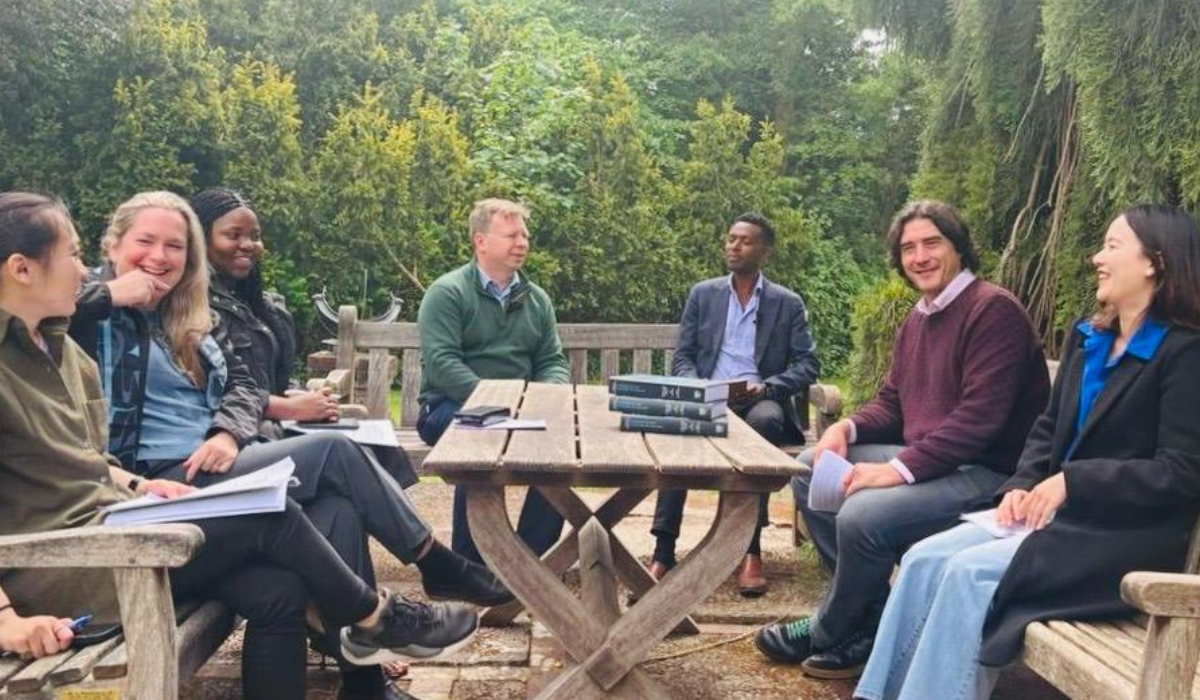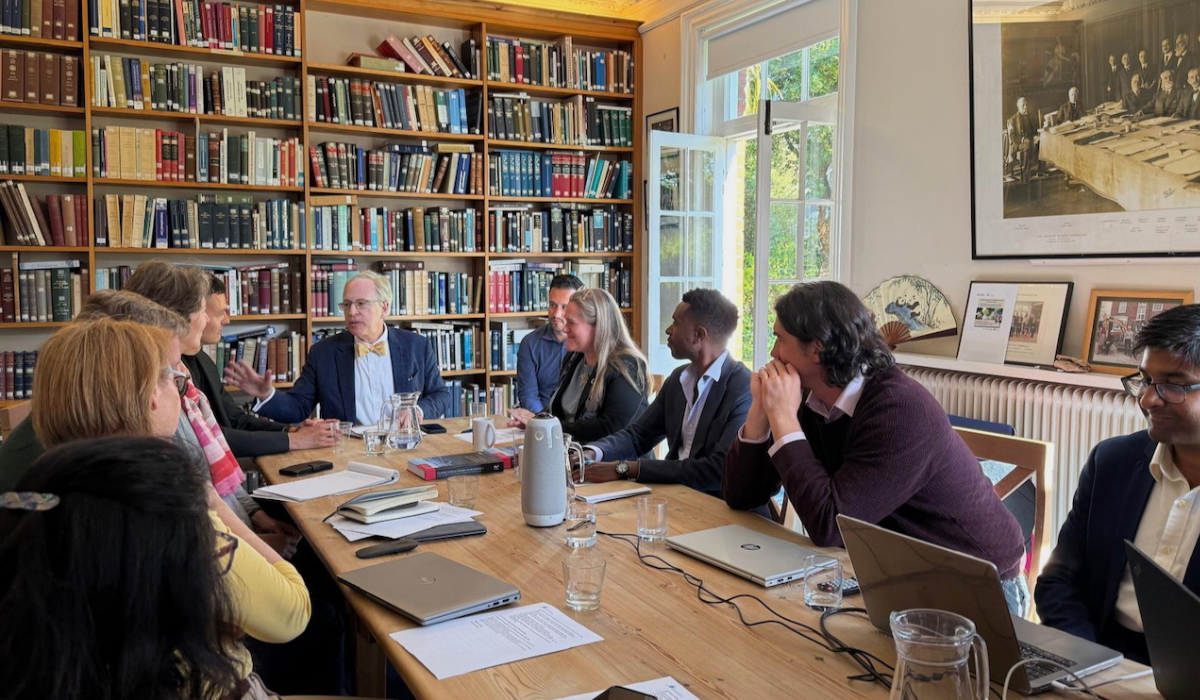Co-hosted by Lucy Cavendish College and Hughes Hall, DemEd Global is dedicated to equipping emerging leaders with the legal and policy knowledge they need to build a more sustainable and just future.
When the Democratising Education for Global Sustainability and Justice (DemEd) Programme team (DemEd Global) returned from COP29 in Baku last November, they brought back more than declarations and discussion summaries. They came home with stories—of resilience, ambition, and the kind of leadership the world needs now more than ever. The shifting winds of climate politics—from renewed ambition to backsliding policies—remind us that real progress requires more than pledges. It demands people—empowered, informed, and prepared to lead. That’s why the DemEd programme continues to grow as a beacon for current and future climate leaders, especially those from communities on the frontlines of the triple planetary crisis. At a time when truth and trust are in short supply, education grounded in justice and sustainability is one of the most powerful tools we have.
Co-hosted by Lucy Cavendish College and Hughes Hall at the University of Cambridge, DemEd Global is dedicated to equipping emerging leaders—many from the world’s most climate-vulnerable regions—with the legal and policy knowledge they need to build a more sustainable and just future. Under the leadership of Professor Marie-Claire Cordonier Segger (DemEd Programme Director; Chair in Sustainable Development Law and Policy at Lucy Cavendish) and support from Lucy Cavendish affiliates, including Dr Howard Nelson (DemEd Programme Advisor; Lucy Cavendish Lecturer in Conservation Leadership), Professor Henriette Hendriks (DemEd Programme Advisor; Lucy Cavendish Professor in Language Acquisition and Cognition; Vice-President of Lucy Cavendish College), and Professor Dame Madeleine Atkins (DemEd Instructor; President of Lucy Cavendish College), the programme transforms vision, solidarity and academic rigor into real-world impact. The college is very grateful to Dr Gabrielle Sacconaghi Bacon for her generous contributions to the programme.

This year has seen the programme grow in both scale and reach. Over 4,000 learners from over 120 countries applied to join DemEd Global’s spring and summer offerings. Three flagship courses—Wealth Economy, Trade Rules, and The UN Convention on the Rights of the Child—are drawing an inspiring mix of policymakers, professionals, advocates, and scholars committed to building fairer, sustainable futures from across the globe. These are not abstract learners. They are passionate changemakers driving real impact within and beyond their communities. In Nepal, a youth leader is utilising his takeaways from the Trade Rules course to advance an International Court of Justice campaign, while preparing to host the 2025 South Asian Climate Justice Camp. In Nigeria, the founder of a child rights NGO sees the CRC course as a way to bring local policies into alignment with global frameworks—empowering her organisation to train others, challenge abuses, and advance legal reforms. In Mexico, a Sustainable Development Engineer working at the country’s largest private university is using his learnings from the Wealth Economy course to scale up his community climate projects. These stories are the beating heart of DemEd Global. They remind us that while the effects of climate change may be global, the solutions must be rooted in local realities, shaped by those who know their communities best. The programme doesn’t hand down policy prescriptions—it provides legal literacy, critical frameworks, and space for collaboration so that changemakers can build what works in their contexts.

Looking ahead, two new courses are currently under development and set to launch in fall 2025. The first, a course on Investment Law, is being designed by Lucy Cavendish LLM candidate Yuxi Shen with the support from DemEd Advisor Matheus Frederico Paes Garcia. This course will complement the current Wealth Economy offering, delving deeper into the legal mechanics of green investment and carbon finance. This course also features the brilliant contributions from Olivia Stolt-Nielsen Meinl, climate and sustainability impact investor, and Felix Zhang, current Lucy Cavendish Fellow (Lucy Cavendish Fellow profile: https://www.lucy.cam.ac.uk/fellows/felix-zhang) and clean energy entrepreneur and investor.
The second, a course on the Convention on the Elimination of All Forms of Discrimination against Women (CEDAW), is being developed by Lucy Cavendish alumnus Muskaan Singh alongside LLM candidate Isabelle Schipper. This offering will explore how gender equality intersects with climate law, land rights, and sustainable finance—giving learners a critical lens on justice and inclusion in global policy.
Beyond its course offerings, DemEd Global continues to convene global legal voices. On 17 May 2025, the programme co-hosted a hybrid roundtable with the Centre for International Sustainable Development Law (CISDL), titled Legal Blueprints for Tackling the Climate and Nature Crises. The session brings together global experts, including Tom Clark, General Counsel of the Asian Development Bank, to discuss how law can serve as a cornerstone of effective, inclusive carbon markets. With climate finance moving quickly but often without safeguards, this event puts a spotlight on how institutions can make law a driver of trust, transparency, and equity.


The roundtable is followed by a UNFCCC June UN Climate Meetings (SB 60) side event co-hosted by DemEd Global and the CISDL. Entitled It’s About the Law: Enhancing Legal Capacity in Climate Negotiations, Finance and Action, the side event focuses on innovations that can close the gap between legal ambition and real-world implementation. In a world of competing interests and growing instability, legal tools that embed accountability and inclusion are more urgent than ever.
Additionally, DemEd Global is advancing cutting-edge research. Professor Marie-Claire Cordonier Segger has just launched a new edited volume—Research Handbook on Investment Law and Sustainable Development—which brings together scholars and practitioners to explore how investment law can be retooled to support sustainability rather than undercut it. In a global economy where capital often moves faster than justice, this work is timely and essential.
At its core, DemEd Global is about building bridges—between law and action, between global conversations and local realities, and between emerging leaders and the tools they need to thrive. These learners are not the leaders of tomorrow. They are the leaders of today—pushing back inertia, asking profound questions, and helping to shape the laws and policies that will define our collective future. For every one of them, DemEd Global will be there—offering learning that is rigorous, relevant, and rooted in justice, sustainability and equity.





